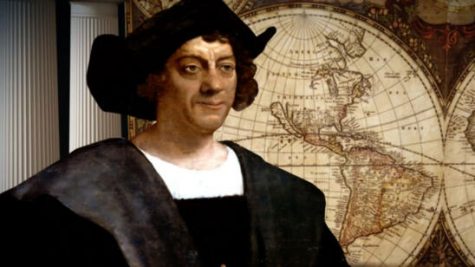Should We Celebrate Columbus Day?

October 13, 2021
Christopher Columbus has been hailed a hero for centuries but in recent years, there has been a growing opposition to celebrating him over his mistreatment of the native populace. I believe it is important to learn about history and to continue to seek to discover new things about it, while also remembering the context of the situation and how we as humans (as Malcolm Gladwell states) “are bad historians”. With that being said, here is my humble opinion on the matter.
I think the new movement against Columbus misses the original point of Columbus Day. Columbus Day, which was originally on October 12th, was declared by Franklin Roosevelt in 1937 to celebrate the achievements of Columbus (which was already celebrated widely since the 18th century) but also to give the discriminated Italian/Catholic American community an icon to help unify around and “assimilate better” into a predominantly Protestant country.
There are few people I can name that have influenced the course of history more than Columbus. I say practically speaking he discovered the America’s because both sides of the Atlantic had no knowledge of the existence of the other. We should remember to celebrate him for the monumental significance of his voyages while learning from his shortcomings. Columbus has many admirable qualities that we all can learn from such as the spirit of exploration, or taking the road not taken. There are not many other people in history who had the courage to venture into the unknown, resilience to face multiple “royal rejections”, and the leadership to put up with a weary near mutinous crew with literally no end in sight.
Violence against natives is often cited as a reason to not celebrate Columbus day. I certainly agree that the violence and disease that followed Columbus’ voyages was disturbing
and terrible, however, we cannot forget that violence went both ways and that is how history has sadly, largely worked for thousands of years. Plagues and wars ravaged Europe and the America’s long before Columbus arrived. As Jared Diamond talks about extensively in his book, Guns, Germs, and Steel, the devastating impact of disease on the native populous of the America’s comes mostly down to geographic bad luck. It was pure luck that Europeans had germs on their side, it could have easily turned out to be the other way around, so why blame Columbus for an inevitable effect he had no knowledge or control over? Instead, we should look to the progress that has come about as a direct result of his discovery. Most notably the eventual founding of this great nation. The founders certainly understood this when they named the nation’s capital Washington D.C after George Washington and Christopher Columbus. 
Columbus is also falsely attributed for seeing the natives as less than human. This is misguided because one of the main things he did in the Americas was converting natives to Catholicism. He thus believed they were perfectly human and had souls that needed saving. He even adopted a young native boy as his own son. Did Columbus’ crew take advantage of natives? Sometimes. Did some of his crew get punished accordingly? Sometimes. Columbus shows up on a new continent after being at sea for over 5 weeks, meeting new people who he cannot verbally communicate with. Should we be surprised that conflicts somehow arose? Of course not. I think most of the modern day stories about Columbus try to paint a black and white picture of what he did, when in reality, like all people, it is always somewhere in the grey. Columbus had reasons for what he did and it doesn’t make sense to sit back with 500 years hindsight and condemn his every wrong move. People in another 500 years could just as easily criticized us for driving cars that run on fossil fuels or wearing clothes that unknown to us were made in a sweat shop in Bangladesh. Does that mean our own achievements shouldn’t be recognized?
The story of Columbus is a complex one but is important nonetheless. He paved the way for the expansion of western society and the continued exploration of the world by others such as Cabot, Magellan, Drake, and Cook. No historical figure can withstand the scrutiny of our modern morals and principles: Columbus is no exception. That doesn’t mean we shouldn’t celebrate him. I choose to celebrate Columbus Day as a day to reflect on Columbus, a day to reflect on early America, and a day to recognize the great achievements of an ordinary self-taught Genoese sailor who forever changed the course of history.


Gigi • Dec 10, 2021 at 9:03 am
Thank you for sharing your amazing thoughts on Columbus!! Great thinking!! Gigi
Laura • Nov 30, 2021 at 9:17 am
Great article! Thank you! I learned a lot.